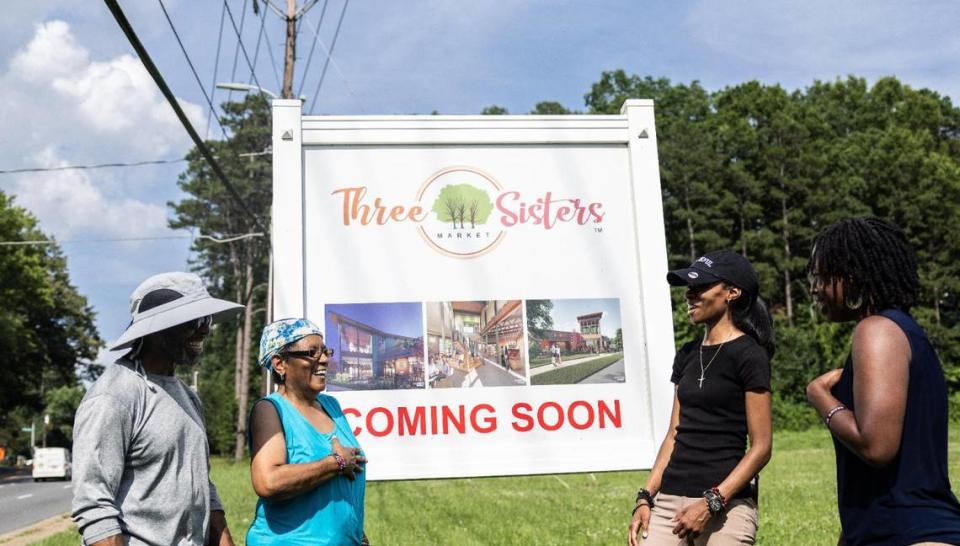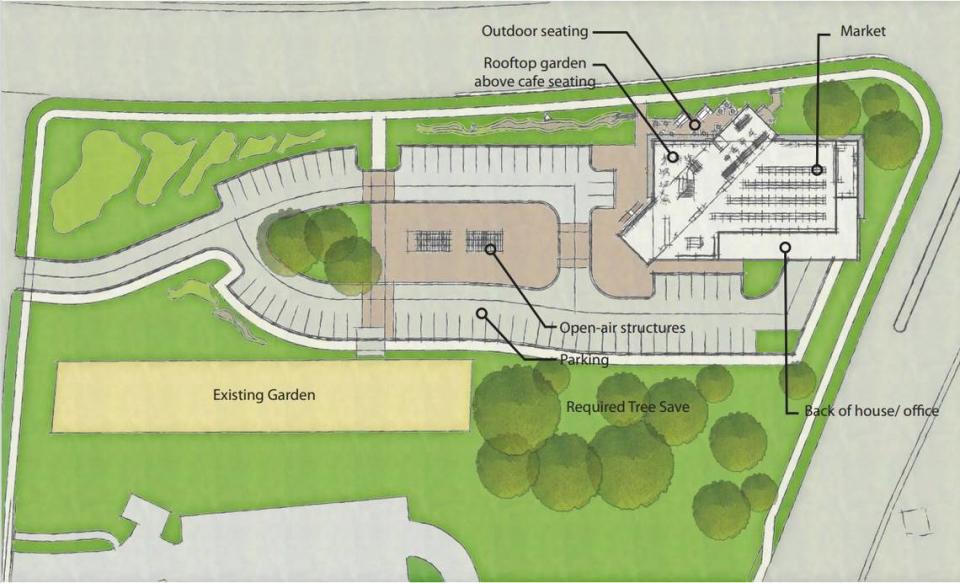Food co-op market aims to open in West Boulevard corridor. ‘We are watering a desert’
After more than 20 years without a grocery store in the West Boulevard corridor, Charlotte residents have found a potential solution of their own — a co-op market.
Three Sisters Market, an initiative by the West Boulevard Neighborhood Coalition, has been in the works for eight years. The co-op grocery store recently received $3 million from county commissioners in addition to other funds from Congressional and city sources. The total cost of the project is expected to be about $10 million, and they have raised just over half that so far.
“(Government officials) are really starting to understand how much of a dire need this is for our communities,” said Sharika Comfort, executive director of the coalition. “We are watering a desert.”
The coalition is comprised of 19 communities and 19,000 residents in predominantly Black west Charlotte.
“It’s insane to me that residents have gone this long without a grocery option,” Comfort said “A grocery store’s primary purpose is to make money as a retailer. Big chain (grocers) did not see the value, or financial gains, of opening a store in the corridor.”
Instead, following research and recommendations in 2021 UNC Charlotte’s Community Innovation Incubator, the coalition is working to build a community-owned food cooperative.
“The co-op market is a testament to the self-sufficiency and resiliency of residents in the community to create the things that we need,” Comfort said.
What to expect at Three Sisters Market
Three Sisters Market will be a full-service grocery store, and is expected to open in 2025 if all goes as planned.
“It will look like a traditional grocery store with aisles stocked with fresh produce, meats, grab-and-go, and fresh and frozen products,” said Rickey Hall, coalition board chair.
The 12,000- to 15,000-square-foot co-op will be on the same 4-acre site as the coalition’s Seeds for Change Urban Farm and seasonal farmer’s market. That’s on Romare Bearden Drive near West Boulevard Library. It’s centrally located, Comfort said, and should help with walkability.
The co-op also will serve as a community gathering place with meeting rooms and a commercial kitchen for demonstrations and classes.

Building the co-op market
Three Sisters Market already is searching for a general manager with a salary range of $80,000 to $90,00, according to the job ad on LinkedIn. The manager will report to a co-op board and handle short- and long-term planning.
A capital campaign will launch in the fall, along with a campaign allowing residents to purchase co-op market shares. “It’s not just a grocery store. It’s a community-driven place,” Comfort said.
A rezoning request was submitted in May. Three Sisters Market hopes to break ground early next year.
Hoping the co-op becomes a destination
The market’s objective is to provide grocery amenities, good-paying jobs and eventually drive more economic development in the corridor.
The corridor has over 100 businesses, Comfort said, but still doesn’t see the same growth and development as other parts of the city.
“We haven’t seen the same investment into West Boulevard as you have in South End. The only thing we can point to is the demographics look differently,” Comfort said. “We want the corridor to be a must-see, must-stop area, much like South End or uptown.”
The hope is that the co-op model can be used in other food deserts in Charlotte while enticing traditional grocers to look again at areas they are not in.
“It’s a true investment to help reshape the narrative along the corridor and encourage other investors to do the same,” Comfort said. “Once they see the success of the co-op model grocery stores, grocery stores may recognize what we’ve known all along, that there’s a market here. People do want to live better, eat better.”
A challenging business
There are at least a dozen co-op markets throughout North Carolina, including the Durham Co-op Market.
General manager Matt Colley said the co-op model is being used in low-income and low-access areas across the nation. His store on Chapel Hill Street is not in a food desert, but serves as a central hub to provide access to natural and organic foods.
Since opening eight years, the market has doubled expected sales, Colley said. It generated over $7.6 million in sales from July 2021 to June 2022, according to a financial summary available online. And this year from January to June, the co-op saw its highest weekly sales ever, Colley said.
The store has indoor and outdoor seating, sells hot and cold food, and has a grab-and-go section and free Wi-Fi.
“We try to encourage the community to come and hang out here as much as possible,” Colley said, “to essentially be a hub in the community.”
Colley said the co-op business is challenging — first raising the money to open it, then hiring a team that can make it successful. “It’s a tough business,” he said. “It’s very tight margins to turn a profit.”

Seasonal farmers market and garden
In Charlotte, Three Sisters Market will open alongside its seasonal garden and farmer’s market.
The farmer’s market was important during the pandemic, Hall said. It was not uncommon for people to shop there daily, helping generate $6,000 a year during the prime of covid from produce grown on-site.
“It was beneficial to meet a community need,” he said.
That money, along with grants and other financial support, also goes toward the Seeds for Change Youth Program. The program provides youths with mentoring, gardening skills and jobs that pay over minimum wage. This year, there are 16 participants and a waiting list.
On a recent June afternoon, participants took turns prepping and tending to the garden, and taking shelter from the hot afternoon sun. Kendale Foxx said it’s his first time in the program. The 17-year-old said he’s enjoying the teamwork.
“We get a taste of what we grow,” he said, pointing out the blackberries and strawberries.
The Urban Farmer’s Market opens July 8. Hours are 9 a.m. to noon Friday and 10 a.m.-2 p.m. Saturday.
Behind the name of the co-op
Three Sisters Market honors female leaders, Hall said.
Lizzie Carr, Rachel Parker and Amay Martin James led the initial advocacy for development and pride in the west side community, according to the nonprofit’s website.
In the 1970s, Maggie Freeman, Lucille McNeil-Chambers and Carrie Graves helped lead change in the corridor.
And, today, Hall pointed out during an interview in June, another a trio of female leaders — executive director Sharika Comfort, Brenda Campbell, board vice chair, and neighborhood ambassador D’Asia Feaster.
One more set of three that Hall noted were the three large trees that stand together on the property.


